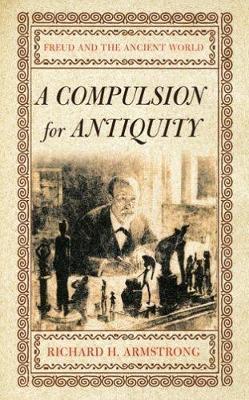A Compulsion for Antiquity: Freud and the Ancient World

A Compulsion for Antiquity: Freud and the Ancient World
"If psychoanalysis is the return of repressed antiquity, distorted to be sure by modern desire, yet still bearing the telltale traces of the ancient archive, then would not our growing distance from the archive of antiquity also imply that we are in the process of losing our grip on psychoanalysis itself, as Freud conceived it?"--from Chapter 1As he developed his striking new science of the mind, Sigmund Freud had frequent recourse to ancient culture and the historical disciplines that draw on it. A Compulsion for Antiquity fully explores how Freud appropriated figures and themes from classical mythology and how the theory and practice of psychoanalysis paralleled contemporary developments in historiography, archaeology, philology, and the history of religions. Drawing extensively from Freud's private correspondence and other notes and documents, Richard H. Armstrong touches on Freud's indebtedness to Sophocles and the Oedipus complex, his interest in Moses and the Jewish religion, and his travels to Athens and Rome.Armstrong shows how Freud turned to the ancient world to deal with the challenges posed by his own scientific ambitions and how these lessons influenced the way he handled psychic "evidence" and formulated the universal application of what were initially isolated clinical truths. Freud's narrative reconstructions of the past also related to his sense of Jewishness, linking the historical trajectory of psychoanalysis with contemporary central European Jewish culture. Ranging across the breadth of Freud's work, A Compulsion for Antiquity offers fresh insights into the roots of psychoanalysis and fin de siècle European culture, and makes an important contribution to the burgeoning discipline of mnemohistory.
PRP: 246.33 Lei
Acesta este Pretul Recomandat de Producator. Pretul de vanzare al produsului este afisat mai jos.
221.70Lei
221.70Lei
246.33 LeiLivrare in 2-4 saptamani
Descrierea produsului
"If psychoanalysis is the return of repressed antiquity, distorted to be sure by modern desire, yet still bearing the telltale traces of the ancient archive, then would not our growing distance from the archive of antiquity also imply that we are in the process of losing our grip on psychoanalysis itself, as Freud conceived it?"--from Chapter 1As he developed his striking new science of the mind, Sigmund Freud had frequent recourse to ancient culture and the historical disciplines that draw on it. A Compulsion for Antiquity fully explores how Freud appropriated figures and themes from classical mythology and how the theory and practice of psychoanalysis paralleled contemporary developments in historiography, archaeology, philology, and the history of religions. Drawing extensively from Freud's private correspondence and other notes and documents, Richard H. Armstrong touches on Freud's indebtedness to Sophocles and the Oedipus complex, his interest in Moses and the Jewish religion, and his travels to Athens and Rome.Armstrong shows how Freud turned to the ancient world to deal with the challenges posed by his own scientific ambitions and how these lessons influenced the way he handled psychic "evidence" and formulated the universal application of what were initially isolated clinical truths. Freud's narrative reconstructions of the past also related to his sense of Jewishness, linking the historical trajectory of psychoanalysis with contemporary central European Jewish culture. Ranging across the breadth of Freud's work, A Compulsion for Antiquity offers fresh insights into the roots of psychoanalysis and fin de siècle European culture, and makes an important contribution to the burgeoning discipline of mnemohistory.
Detaliile produsului








